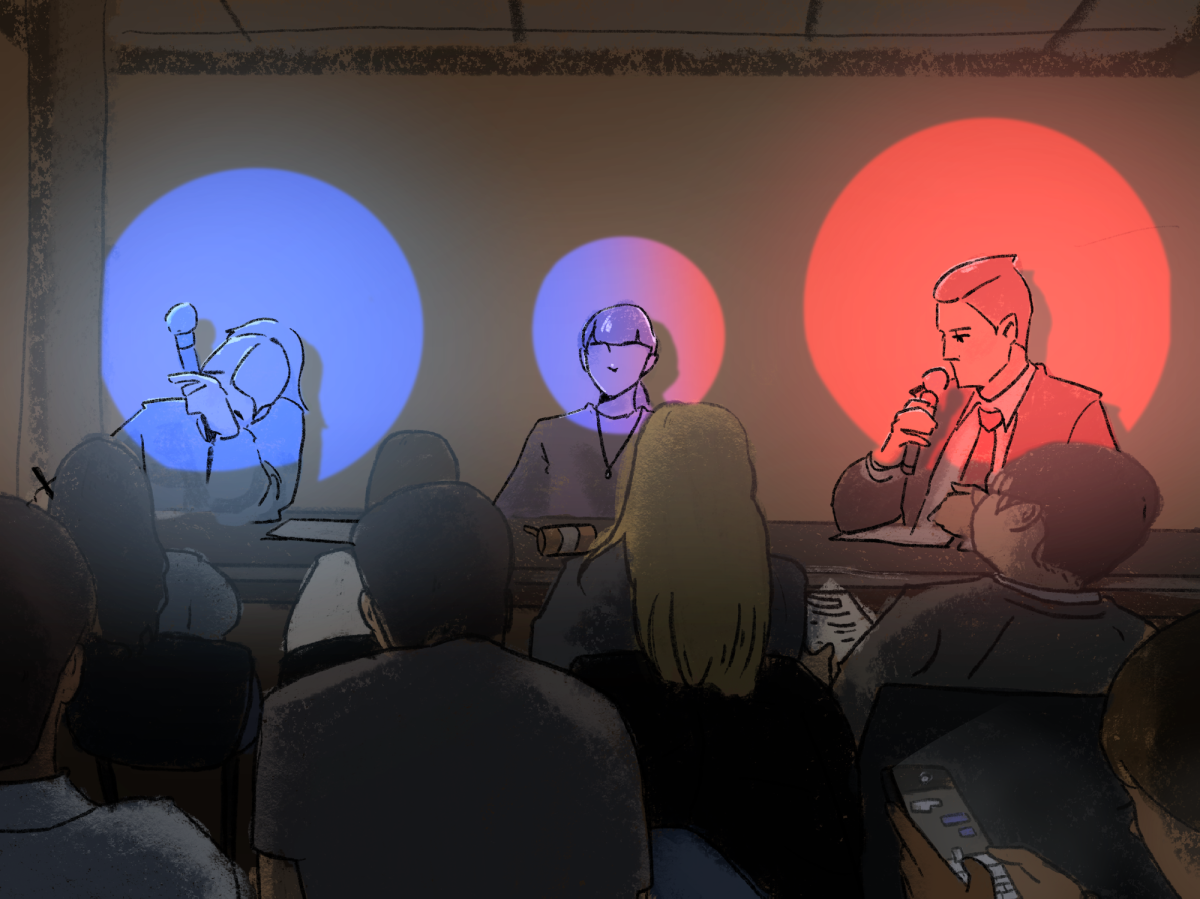Dissent flared in discussions about the economy, gun control policy and voter registration during the Politics Society at NYU’s annual inter-club debate between the College Democrats and College Republicans on Tuesday. The crowd saw more than 70 students at the Kimmel Center for University Life, who were repeatedly hushed by the event’s moderators.
Members of the College Democrats and College Republicans called the annual debate a chance to hash out disputes and talk through relevant federal policies. Saha Guerrero, the president of the College Democrats, said the debate was an opportunity to hear unpopular political opinions at NYU.
Some audience members told WSN they stopped by the debate for entertainment value more than anything else. Throughout the discussion, the crowd’s booing and applause drowned out debaters’ mics, often halted with taps of a gavel.
“Nothing is really going to change with how we view each other,” said Kaya Walker, the president of NYU’s College Republicans. “We don’t take each other seriously.”
Economy
The debate kicked off with discourse on economic policy, to what extent the federal government should tax foreign imports and whether the United States should provide aid to Ukraine in its war with Russia. College Democrats representative Sebastián Prats-Fernández disputed President-elect Donald Trump’s promise to raise tariffs, arguing that they are unnecessary and will heighten prices for consumers. College Republicans representative Daniel Chen said in a rebuttal that a 60% tariff on China’s exported goods will incentivize companies to build manufacturing facilities in the United States.
As the two club members were debating the tariff’s implications on U.S. economic development, Chen interrupted Prats-Fernández, who was nearing the end of his time limit, to strike down his point. Prats-Fernández responded, “Hold on, ‘I’m speaking’ — sound familiar?” The comment garnered a collective gasp from the crowd and a request from the moderator to “keep it civil.”
“The cackling, sneers and jeers at conservative arguments continue to demonstrate to me the level of disdain, scorn and dismissal Democrats have towards us,” Chen said in a statement to WSN. “It’s visible in their behavior that they treat us as ignoramuses, as dullards unworthy of respect, and it’s a shame to see.”
At the debate, Prats-Fernández said the Trump administration’s last tariff policy cost the government and limited accessible aid to farmers. Chen refuted that Democrats used “shameless appeals to emotion” and tariffs were necessary to protect the country’s economy and domestic production.
Prats-Fernández and Chen also discussed government spending, specifically in social security programs and toward foreign aid in Ukraine. Chen called for fewer federal expenditures on welfare initiatives and argued that Ukraine is not a valuable U.S. ally, while Prats-Fernández said the United States should keep its alliances to maintain as many trading partners as possible.
“It’s crucial that we encourage the trade of goods and not the trade of blows,” Prats-Fernández said during the debate. “Much like we’re up here tonight despite our differences, we should open the doors for our industries, despite otherwise rocky relationships.”
Gun control
In interviews with WSN following the debate, representatives from both clubs concluded that the discussion on gun control had been somewhat anti-climactic. While they argued about the status of firearms as a constitutionally protected right, both Democratic and Republican representatives agreed that there is a need for increased background checks.
“We found common ground on the background check, but it’s important to continue those conversations,” Guerrero said. “Our generation surprises a lot of people with all their different takes, so it would be interesting to find more common ground with Republicans on this topic.”
The two sides debated whether firearm possession functions as more of a safety precaution or hazard. After CAS junior Josie Leach, who represented the Democrats, proposed safety reforms and assault weapon bans, Republican representative Julian Li argued that the right to own firearms is critical to a “defense against tyranny.”
“Democrats love to talk about minority rights,” Li said during the debate. “Well, if you’re living in the Deep South, and the KKK is terrorizing people of color, wouldn’t you want the people of color to own weapons to defend themselves against those racists?”
Li’s argument was immediately met with murmurs and chuckles from attendees across the room.
Leach said the danger intrinsic in access to firearms was exacerbated by a lack of background checks. Li agreed, specifying that an individual’s mental health should be carefully considered before they are able to own a gun. When Leach cited recent assassination attempts against Trump, arguing that even government officials have been unable to prevent danger from an individual with an unchecked firearm, Democratic attendees let out a light bout of laughter.
Voter registration
For the debate’s final section, representatives from the two parties bickered over whether voters should be required to bring their IDs to the polls. College Republicans representative Moulay Aemen said that government-issued voter IDs are critical for maintaining vote security, while College Democrats representative Reed Easterling said they create an unnecessary barrier to casting a ballot.
The banter escalated as Aemen contested Easterling’s points, prompting the debate’s moderator to instruct speakers to let their opponent finish. The two continued to interrupt each other until their time ran out as they were each referencing their own voting experiences.
“There’s a lot of heightened emotions around it, so I feel like it’s mostly entertainment,” said CAS student Clara Ngume-Sone, who attended the debate. “With students up there, it’s not going to be the most productive debate.”
Contact Kaitlyn Sze Tu at [email protected].


























































































































































